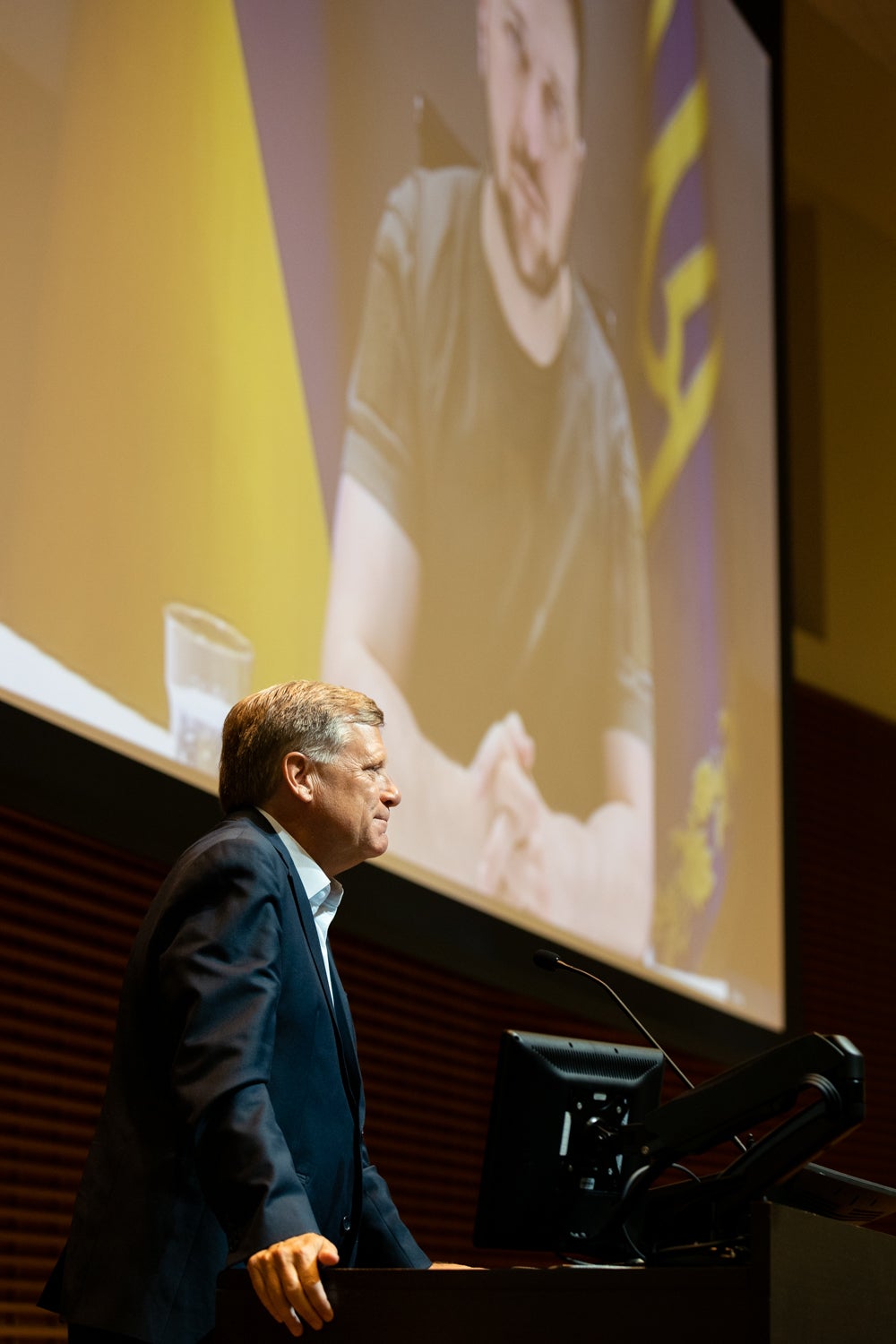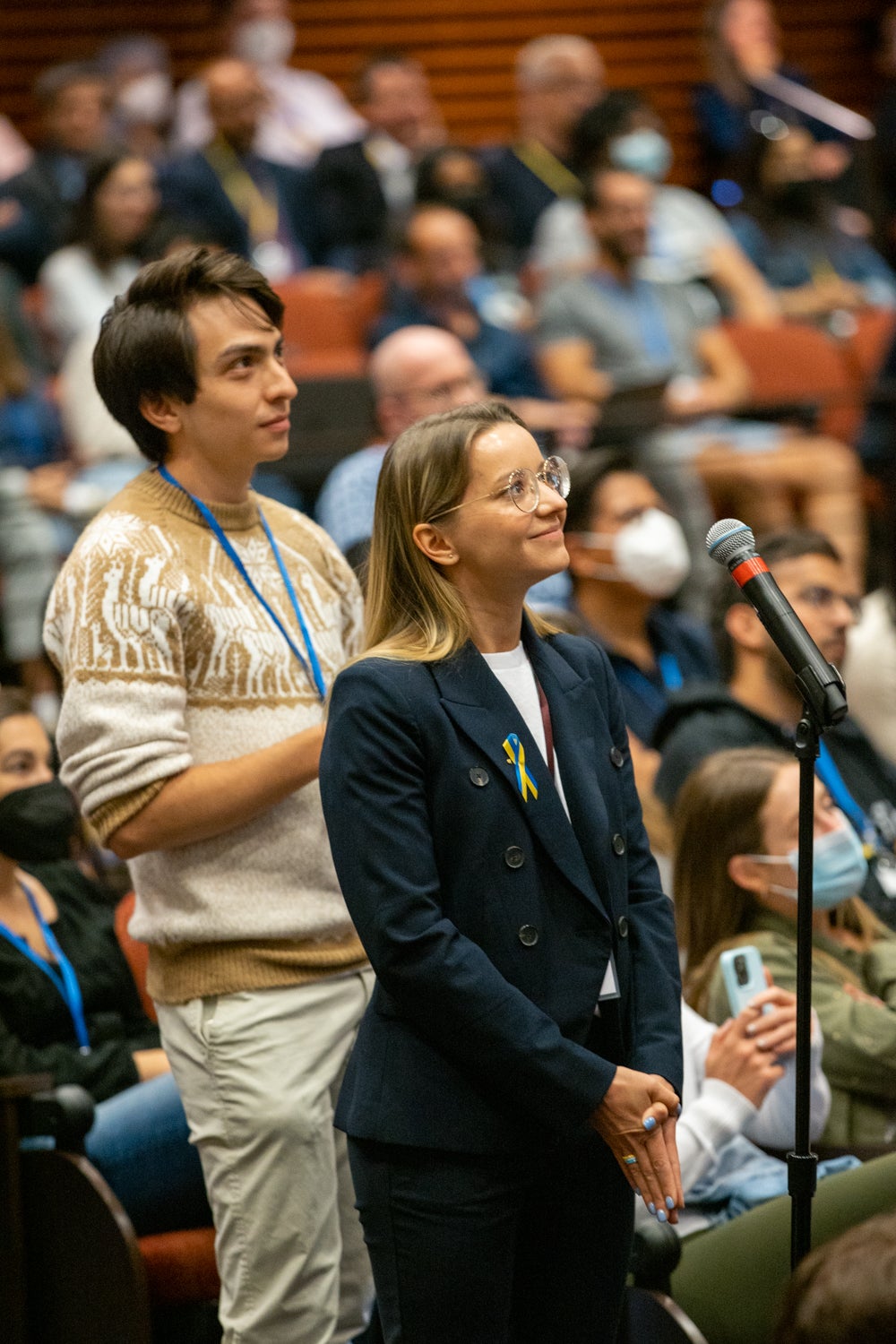More than 90 days after Russia invaded Ukraine, Ukrainian President Volodymyr Zelenskyy asked Stanford students to consider the question, “What matters most to you and why?” during an event hosted by the Freeman Spogli Institute for International Studies (FSI) on Friday.
The approximately 600 people in the audience loudly cheered and gave a standing ovation as Zelenskyy was livestreamed from Ukraine onto a large screen in a packed CEMEX Auditorium, prompting the Ukrainian president to smile and shake his head. In September, Zelenskyy became the first Ukrainian president to visit California when he spoke at Stanford during a historic address from FSI.
“It’s a great honor, for the second time, to have a chance to address your community, the community of Stanford University, to students, to professors, to all the Americans who feel support, who are feeling nervous because of our fight for freedom,” Zelenskyy said, speaking through an interpreter. “I’m grateful for your interest and for so many sincere good viewpoints and expressions that I can see.”
While much has changed since September, much has remained the same, Zelenskyy said. “Ukraine is the country where everything is possible … Ukraine is the country who destroyed the myth about the enormous capabilities of the Russian forces.”
During his speech, the Ukrainian president drew a parallel between the deadly mass shooting this week in Uvalde, Texas, where an 18-year-old gunman fatally shot 19 schoolchildren and two adults, and the incomprehensible violence inflicted by 18-year-old Russian troops in Ukraine.
“We are living in terrible times when American people express their condolences because of the death of [Ukrainians] at war and we express our condolences because of death” during peacetime in America, he said. “Accept my condolences, please.”
‘We remain free’
Zelenskyy was introduced by Michael McFaul, director of FSI and former U.S. ambassador to Russia. McFaul thanked Zelenskyy for honoring the Stanford community with his presence and said that Stanford has a long history of engagement with Ukraine, including more than 200 Ukrainians participating in various training programs mostly run through FSI. He noted that many Stanford alumni now work for Zelenskyy.

Michael McFaul, director of the Freeman Spogli Institute for International Studies, listens as Ukrainian President Volodymyr Zelenskyy speaks during a virtual address to students on Friday. (Image credit: Andrew Brodhead)
“I want to thank you, your warriors, and all Ukrainians for leading the fight for democracy, freedom, and sovereignty, and against tyranny, repression, and imperialism, not only in Ukraine but for the entire free world in the fight between democracy and dictatorship, colonialism and independence, and good and evil,” McFaul said. “No nation in the world is sacrificing more than Ukrainians. … In these dark times in Ukraine, around the world, and even here, yes, in my own country, we need heroes. You are a hero, Mr. President, not just for Ukraine, not just for Europe, but for the entire world.”
Several audience members brought Ukrainian flags or wore outfits of bright blue and yellow – the country’s national colors. Gazing out across the audience, Zelenskyy noted people were not wearing armored vests or helmets, nor were they cowering in bomb shelters or wounded by enemy shelling. “Unfortunately, this is not the case for Ukraine,” he said.
Answering the question he first posed to the Stanford audience, Zelenskyy said that what matters most for him is to give his country everything necessary to defend its freedom, such as “the weapons that can help us overcome the might of the Russian army, the sanctions that will stop the flow of money used for the Russian terror finance,” war tribunals, and more.
Zelenskyy said he was inspired after visiting Stanford last September as he considered what the U.S. and Ukraine could accomplish together.
“I believe that many of you will indeed visit Ukraine, help Ukraine in the reconstruction after the war, because this is the biggest project for freedom, and your generation will take its crucial part in it,” Zelenskyy said. “Our citizens’ towns are devastated, our seas are blocked, but we remain free.”
‘See the truth’
More than two dozen people stood in line to ask Zelenskyy a question during the event, oftentimes addressing the Ukrainian president in his own language. Zelenskyy’s responses were often lighthearted, prompting laughter from the energetic early morning crowd. He jokingly told one student that she looked Ukrainian – though she was German – and said she should thank her parents for that. He teased another student for speaking about his youth in the past tense.

Kateryna Sliunkova, ’22, waits to ask a question at a virtual address by Ukrainian President Volodymyr Zelenskyy at CEMEX Auditorium. (Image credit: Andrew Brodhead)
Other times, the back-and-forth between Zelenskyy and the audience was more somber. First-year MBA student Olga Chyumanskaya said she is “a young Russian person who shares democratic values [of] freedom, and would like to see my home country develop in a different direction.” The Russian community abroad is working to support Russian independent journalism and Ukrainian refugees, she said, but every day, she asks herself if she did enough. On Friday, she asked Zelenskyy what more she should do.
Zelenskyy told Chyumanskaya that she and other Russians could help pierce the state-sponsored bubble of disinformation that envelops their home country. “You see the truth,” he said. “You get the knowledge in the United States. You can demonstrate to the world which is bigger than Russia, which is bigger than Ukraine, [or] any country, for that matter. The world is big. And we have to remove the frontiers, open the borders, and bring the truth in with our knowledge, with conviction, so much with persuasion.”
School of Medicine student Solomiia Savchuk and computer sciences graduate student Zoe Von Gerlach are co-founders of TeleHelp Ukraine, a telehealth resource initiated by Stanford students to connect Ukrainians in need of medical assistance to U.S.- and Ukraine-based physicians. On Friday, they asked Zelenskyy about how Stanford students can further assist, as well as why activism abroad is important.
Zelenskyy said there’s a need not only for blood and oxygen but also for psychological rehabilitative support now and after the war, in which telehealth resources could greatly help. He encouraged the students to contact McFaul to discuss ways they might connect with Ukraine’s Ministry of Health. He added that students’ activism is “extremely important” in reminding world leaders of the need to support Ukraine, as this war “recognizes no distances.”
In closing the event, Zelenskyy reminded the audience that around the world, some are studying at universities while others are drafted into war and won’t live to write a college thesis.
“That is a terrible story. That’s why I would like to wish to all the students, I would like to wish you a long and interesting life in what you’re doing – in science, in journalism, in art, in whatever [you do],” he said. “I would sincerely like to wish you peace.”